Related Research Articles
Nicolaism was an early Christian sect mentioned twice in the Book of Revelation of the New Testament. The adherents were called Nicolaitans, Nicolaitanes, or Nicolaites. They were considered heretical by the mainstream Church. According to Revelation 2:6 and 15, they were known in the cities of Ephesus and Pergamum. In this chapter, the church at Ephesus is endorsed for "[hating] the works of the Nicolaites, which I also hate"; and the church in Pergamos is rebuked: "So thou hast also some [worshiping in their midst] who hold the teaching of the Nicolaites".
Christianity demonology is the study of demons from a Christianity point of view. It is primarily based on the Bible, the exegesis of these scriptures, the scriptures of early Christianity philosophers, hermits and the associated traditions and legends incorporated from other beliefs.
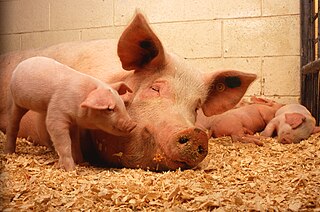
In some religions, an unclean animal is an animal whose consumption or handling is taboo. According to these religions, persons who handle such animals may need to ritually purify themselves to get rid of their uncleanliness.
Christian vegetarianism is the practice of keeping to a vegetarian lifestyle for reasons connected to or derived from the Christian faith. The three primary reasons are spiritual, nutritional, and ethical. The ethical reasons may include a concern for God's creation, a concern for animal rights and welfare, or both. Likewise, Christian veganism is not using any animal products for reasons connected to or derived from the Christian faith.
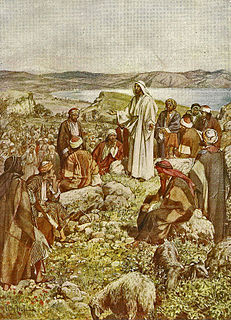
Matthew 5:20 is the twentieth verse of the fifth chapter of the Gospel of Matthew in the New Testament and is part of the Sermon on the Mount. Jesus has reported that he came not to destroy the law, but fulfill it. But in this verse, he makes clear that the common understanding of the Law is not enough.

Mark 7 is the seventh chapter of the Gospel of Mark in the New Testament of the Christian Bible. This chapter explores Jesus' relationships with both fellow Jews and Gentiles. Jesus speaks with the Pharisees and scribes, and then with his disciples, about defilement, and then heals two gentiles.
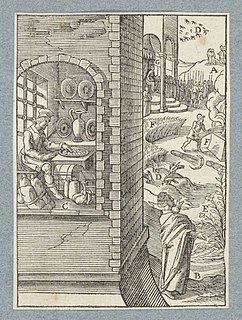
Matthew 6:26 is the twenty-sixth verse of the sixth chapter of the Gospel of Matthew in the New Testament and is part of the Sermon on the Mount. This verse continues the discussion of worry about material provisions. In this verse Jesus tells his followers not to be anxious about food, but to rely on God as the birds, who are worth far less than people, are fully provided for.
Religious restrictions on the consumption of pork are a common food taboo, particularly in the Middle East among Jews and Muslims. Swine were prohibited in ancient Syria and Phoenicia, and the pig and its flesh represented a taboo observed, Strabo noted, at Comana in Pontus. A lost poem of Hermesianax, reported centuries later by the traveller Pausanias, reported an etiological myth of Attis destroyed by a supernatural boar to account for the fact that "in consequence of these events the Galatians who inhabit Pessinous do not touch pork". Concerning Abrahamic religions, clear restrictions exist in Jewish dietary laws (Kashrut) and in Islamic dietary laws (Halal).

Matthew 7:6 is the sixth verse of the seventh chapter of the Gospel of Matthew in the New Testament and is part of the Sermon on the Mount.

John 1:5 is the fifth verse in the first chapter of the Gospel of John in the New Testament of the Christian Bible.
Matthew 11:25 is the 25th verse in the eleventh chapter of the Gospel of Matthew in the New Testament.
Matthew 15:10 is a verse in the fifteenth chapter of the Gospel of Matthew in the New Testament.

Kosher animals are animals that comply with the regulations of kashrut and are considered kosher foods. These dietary laws ultimately derive from various passages in the Torah with various modifications, additions and clarifications added to these rules by halakha. Various other animal-related rules are contained in the 613 commandments.
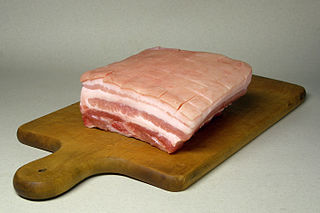
Pork is the culinary name for the meat of a domestic pig. It is the most commonly consumed meat worldwide, with evidence of pig husbandry dating back to 5000 BC.
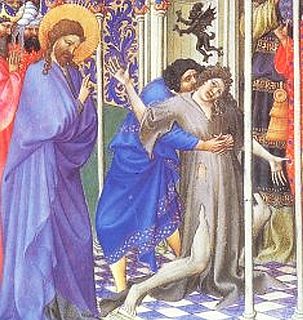
In English translations of the Bible, unclean spirit is a common rendering of Greek pneuma akatharton, which in its single occurrence in the Septuagint translates Hebrew ruaḥ tum'ah.

The exorcism of the Gerasene demoniac, frequently known as the Miracle of the (Gadarene) Swine and the exorcism of Legion, is one of the miracles performed by Jesus according to the New Testament. The story shows Jesus exorcising a demon or demons out of a man and into a herd of swine, causing the swine to run down a hill into a lake and drown themselves.

The Discourse on Defilement is an account of the teaching of Jesus recorded in the New Testament in the Gospel of Matthew 15:1–20 and the Gospel of Mark 7:1–23.

In mainstream Nicene Christianity, there is no restriction on kinds of animals that can be eaten. This practice stems from Peter's vision of a sheet with animals, described in the Book of Acts, Chapter 10, in which Saint Peter "sees a sheet containing animals of every description lowered from the sky." Nonetheless, the New Testament does give a few guidelines about the consumption of meat, practiced by the Christian Church today; one of these is not consuming food knowingly offered to pagan idols, a conviction that the early Church Fathers, such as Clement of Alexandria and Origen, preached.

John 1:3 is the third verse in the first chapter of the Gospel of John in the New Testament of the Christian Bible.
Matthew 15:15-18 is a set of verses in the fifteenth chapter of the Gospel of Matthew in the New Testament.
References
- ↑ Robert Witham, Annotations on the New Testament of Jesus Christ. Dublin: 1730.
- ↑ John MacEvilly, An Exposition of the Gospel of St. John consisting of an analysis of each chapter and of a Commentary critical, exegetical, doctrinal and moral, Dublin Gill & Son 1879.
- 1 2 3 4 "Catena Aurea: commentary on the four Gospels; collected out of the works of the Fathers. Oxford: Parker, 1874. Thomas Aquinas".
 This article incorporates text from this source, which is in the public domain.
This article incorporates text from this source, which is in the public domain.